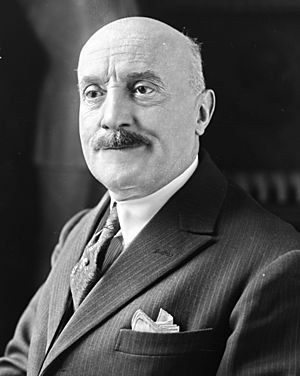Joseph Caillaux facts for kids
Quick facts for kids
Joseph Caillaux
|
|
|---|---|
 |
|
| Prime Minister of France | |
| In office 27 June 1911 – 11 January 1912 |
|
| President | Armand Fallières |
| Preceded by | Ernest Monis |
| Succeeded by | Raymond Poincaré |
| Personal details | |
| Born |
Joseph-Marie–Auguste Caillaux
30 March 1863 |
| Died | 22 November 1944 (aged 81) |
| Political party | Radical Party |
Joseph Caillaux (born March 30, 1863, died November 22, 1944) was an important French politician during the Third Republic. He was a leader of the French Radical Party and served as Minister of Finance. He had modern ideas, especially about money and taxes, but his views on the military were different from many conservative people. He faced some challenges in his career, but he remained a powerful figure in French politics for many years.
Contents
Joseph Caillaux's Early Life and Career
Joseph Caillaux studied law and worked as a finance inspector starting in 1888. He spent a lot of his early career in Algiers. In 1898, he was elected to the Chamber of Deputies, which is like a parliament.
He became the Minister of Finance in 1899. This meant he was in charge of France's money and economy. He held this important job again in 1906. In 1907, he helped create a law to stop people from cheating with wine, which was a big issue at the time.
Becoming Prime Minister and Key Decisions
In 1911, Joseph Caillaux became the Prime Minister of France. As the leader of the Radicals, he believed in trying to get along with Germany. During his time as Prime Minister, he helped keep the peace during a big international event called the Second Moroccan Crisis in 1911.
However, he and his team had to resign in January 1912. This happened because it was found out that he had talked secretly with Germany without telling the President, Armand Fallières. This was seen as a serious problem.
Later Political Influence and Challenges
Even after resigning as Prime Minister, Caillaux remained a very influential person in French politics because of his skills with money matters. He strongly disagreed with a law that would make military service longer. While the law passed, his actions helped bring down the government that supported it in 1913.
He later became Minister of Finance again. He was a big supporter of a new tax system called an income tax, which was a major change for France. This idea, along with some of his other views, worried many conservative people in the country. He faced many attacks from newspapers and other politicians.
In 1914, a newspaper called Le Figaro started publishing personal letters related to Caillaux. This led to a big scandal. His wife, Henriette, was involved in a serious incident with the newspaper's editor, which caused Caillaux to resign from his role as Minister of Finance.
World War I and Later Years
During World War I, Joseph Caillaux became a leader of a group in the government that wanted to find a way to make peace. He tried to gain support for his ideas by funding newspapers and working behind the scenes. Some people saw him as someone who wanted to make a deal with Germany, even if it meant France might lose.
In 1917, he was accused of working against France's interests during the war. After a long legal process, he was found guilty and faced serious consequences, which temporarily stopped his political career. He was not allowed to live in France for five years and lost his civil rights for ten years.
After the war, he was able to return to politics. He served in different left-wing governments in the 1920s. Joseph Caillaux passed away in 1944 and is buried in the Père Lachaise Cemetery in Paris.
See also
 In Spanish: Joseph Caillaux para niños
In Spanish: Joseph Caillaux para niños
- List of people on the cover of Time Magazine: 1920s
Images for kids
 | Kyle Baker |
 | Joseph Yoakum |
 | Laura Wheeler Waring |
 | Henry Ossawa Tanner |


